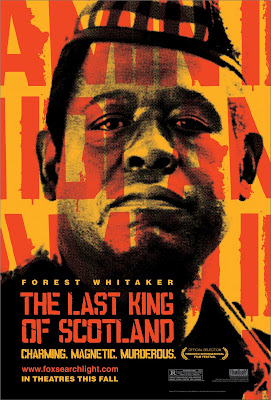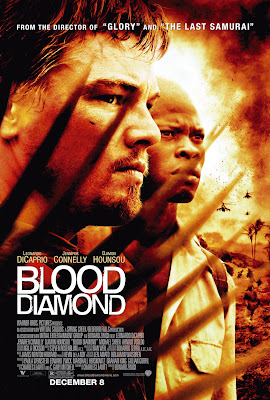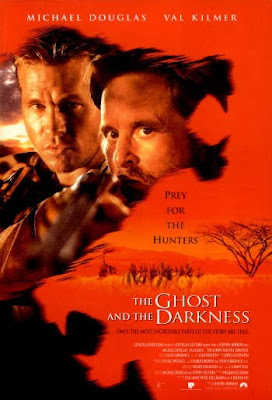 My DVD pick on the June 17th edition of Maverick at the Movies is The Last King of Scotland, a dramatized portrayal of Ugandan dictator Idi Amin. After I watched it, I looked around for some other critical reactions. I had heard that some people had criticized the film as racist, a white man’s depiction of Africa as a savage continent. Although most critics at rottentomatoes.com gave the film a positive review, the negative reviews did level this accusation at the film:
My DVD pick on the June 17th edition of Maverick at the Movies is The Last King of Scotland, a dramatized portrayal of Ugandan dictator Idi Amin. After I watched it, I looked around for some other critical reactions. I had heard that some people had criticized the film as racist, a white man’s depiction of Africa as a savage continent. Although most critics at rottentomatoes.com gave the film a positive review, the negative reviews did level this accusation at the film:
The colonialist spirit is alive and well in The Last King of Scotland, a return to the pandering celluloid depictions of African turmoil that insist on putting a white face on black suffering.
–Jan Stuart, Newsday
I had heard some of the same comments upon the release of Blood Diamond:
 Africa has long been exploited by the West: for ivory, for gold, for diamonds, for oil. And, more recently, for, and by, Hollywood.
Africa has long been exploited by the West: for ivory, for gold, for diamonds, for oil. And, more recently, for, and by, Hollywood.
–Stephen Rea, Philadelphia Inquirer
DiCaprio is terrific, but he can’t save this lecture from the shame of using Africa as a vehicle for another white man’s redemption.
–Peter Travers, Rolling Stone
Action and message cancel each other out. To put it another way, this movie wants you to be appalled by the real slaughter of Africans by Africans – which it blames on you – but be entertained by the slaughter of Africans by DiCaprio.
–Kyle Smith, New York Post
While I will admit that Blood Diamond was a flawed film, it did make my Honorable Mentions of 2006 list and I stand by that. What I see in these critical reactions is a slight misinterpretation of the text. Yes, these films, like Joseph Conrad’s novella Heart of Darkness, place white men in the jungles of Africa wherein they discover some evil part of humanity. And some people have objected to these texts, especially Conrad’s, on the basis that the stories debase the native population. “Why should these indigenous cultures be the savages?” they ask. “Why is their culture equated with barbarity?” That does set up a problem, especially in a time when people are concerned with representation in art.
I think the questions and accusations are just slightly off, because the people making them presume that these texts equate the indigenous with savagery. I would challenge that, especially in these particular films. Idi Amin was a by-product of the colonial system, and this point is made in the course of the film. The Last King of Scotland points out that the British supported his coup and the political structures that Amin walked into were a result of the Uganda’s history as a British territory. In Blood Diamond, the civil war in Seirra Leone is result of and supported by Western demands for illegal diamonds. DiCaprio starts out as a part of that system but ends up being redeemed by coming to the aid of indigenous people and fighting that system. The villains of the film are both white and black, and the film shows that greed knows no color barrier.
 In The Ghost and the Darkness, a film also mentioned on this episode of Maverick at the Movies, a pair of lions bring construction of a British railroad to a halt as they prey on the workers. The lions are identified by some Africans as the ghosts of dead medicine men who have come to stop the expansion of Western power. While the movie is flawed in many ways, it is an interesting portrayal of nature run amok because of the presence of the colonial power. The lions are a metaphor for nature balancing against the intrusion of Western industry upon the African continent and in this story nature turns against both whites and blacks as they attempt to build a bridge to connect the two.
In The Ghost and the Darkness, a film also mentioned on this episode of Maverick at the Movies, a pair of lions bring construction of a British railroad to a halt as they prey on the workers. The lions are identified by some Africans as the ghosts of dead medicine men who have come to stop the expansion of Western power. While the movie is flawed in many ways, it is an interesting portrayal of nature run amok because of the presence of the colonial power. The lions are a metaphor for nature balancing against the intrusion of Western industry upon the African continent and in this story nature turns against both whites and blacks as they attempt to build a bridge to connect the two.
This is not to say that the people of Africa or other places are always represented fairly by Hollywood. Far from it. Consider Birth of a Nation, Rambo: First Blood Part II, and The Patriot. But before critics begin to categorically label films as racist or xenophobic, it would be wise to pull back the other layers of these films and attempt to discover if they penetrate deeper, as these pictures do.
